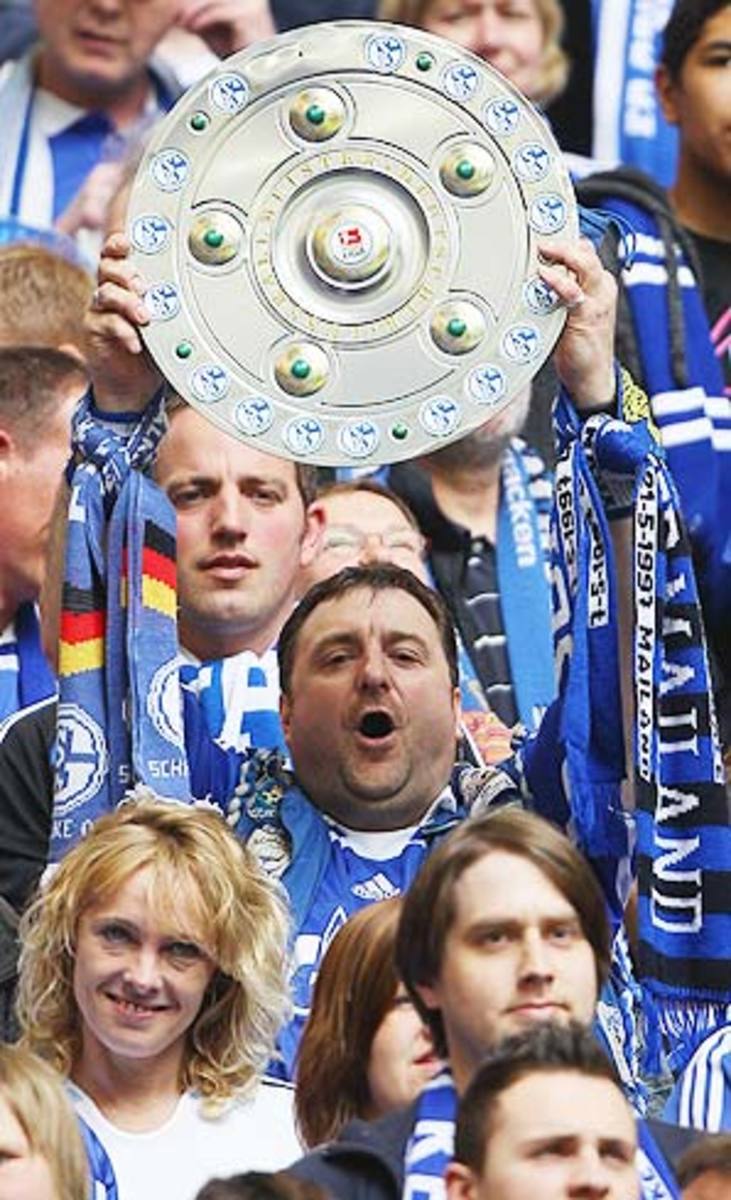With boycott, German fans send message about high ticket prices
On Sept. 19, the 77th Revierderby between Schalke and BV Borussia Dortmund will set another remarkable precedent: A significant section of Borussia supporters will boycott the game in the Veltins-Arena. For the first time in decades, there will be huge gaps in the away fans' section.
The BVB fans' decision not to take up tickets for one of the most important games of the season is not an attempt to push their heavily indebted rivals further toward administration, however.
"This shouldn't be seen as an attack on Schalke 04 or anyone else," said Marc Quambusch, one of the organizers of the boycott. The Dortmund fans were making a more principled stand, he explained to SI.com: "We are not prepared to accept the unreasonable hiking of ticket prices and have therefore decided to say enough is enough."
Schalke is demanding a special 50 percent "top-game surcharge" for the derby. A ticket for the stands costs $25, and seated places range from $56 to $84. Last year, the equivalent ticket for the terrace was $16. Both home and away fans have been hit by this hefty increase. Supporters are wary that the "top-game surcharge" is really being used to usher in higher prices on a much wider scale.
"When the derby ticket prices were announced in the summer, we got angry," said Quambusch, the chairman of BVB supporters group, Borussen Sailors Hamburg. "For many students and younger people, that's just too expensive. So we decided to do something against that. When Dortmund agreed to take back derby tickets that had already been sold under the 'away season ticket scheme,' we knew this protest could really work."
Two hundred fan groups have aligned themselves with the boycott since, and more than 1,000 tickets -- about 1/5 of Dortmund's total allocation for the match -- have already been returned, according to Quambusch. "The difference will be noticeable in the ground, especially in the standing areas," he said.
At Schalke, they are a little suspicious about the Dortmund fans' true motivation. "The timing of this initiative is somewhat unfortunate," said Rolf Rojek, the Royal Blues' former supporter liaison officer. "Because this is Schalke vs. Dortmund, everybody will think that this is about the rivalry, not something more fundamental."
Borussia manager Jürgen Klopp has not exactly helped the boycotters' cause, either, by flippantly linking the protest to Schalke's spending spree in the transfer window. "I think it's great our people don't go there to finance [new striker] Klaas-Jan Huntelaar," Klopp told the newspaper Bild.
Others have accused the no-show fans of hurting their team's chances. "We did consider that side of it," Quambusch said. "I can assure you, no one is happy to miss that match. But football is about more than one game and 22 players. We want to safeguard the game's future. We want to make sure that football will remain affordable. If we simply accept higher prices, we'll end up like the Premier League, where young people are priced out and the crowd is getting older and older. Then we will also lose our unique atmosphere and all the people who support their team by making banners or staging choreographies."
Relatively cheap ticket prices, as well as fan-friendly stadiums with terraces and the right to consume beer, have given the Bundesliga plenty of good press over the last couple of years. This situation amounts to both an "opportunity and obligation" for the German league, the boycott organizers argue on their Web site, www.keinzwanni.de (the name stands for "Kein Zwanni für nen Steher!" or, in English, "20 euros for standing -- no way!"). "Forcing out lower-income groups and financially weak young" would do real long-term damage to the game's popularity, they write.
"Once you lose the 20-year-olds, that's it," Quambusch said. "They won't come back when they're 40."
The derby boycott was only a starting point, he argued. Quambusch wants supporters of all professional clubs to get behind the initiative and to pressure clubs into ensuring a fair pricing structure. Supporters from Aachen have been in touch and there will be an article on the protest in the next Hamburg supporters fanzine.
"The German Football League recently stressed that Germany has the lowest ticket prices in comparison with other top four leagues, and rightly so," Daniel Lörcher, a member ofthe Dortmund fan group The Unity, told 11 Freunde magazine. "But this will only remain the case if someone stands up now and says that we don't have to tag along with the madness that's happening in other countries."
By voting with their feet -- or their wallets, to be more precise -- the supporters have sent a powerful message: The laws of "supply and demand" must be kept in check in order to secure a viable future for the Bundesliga.





